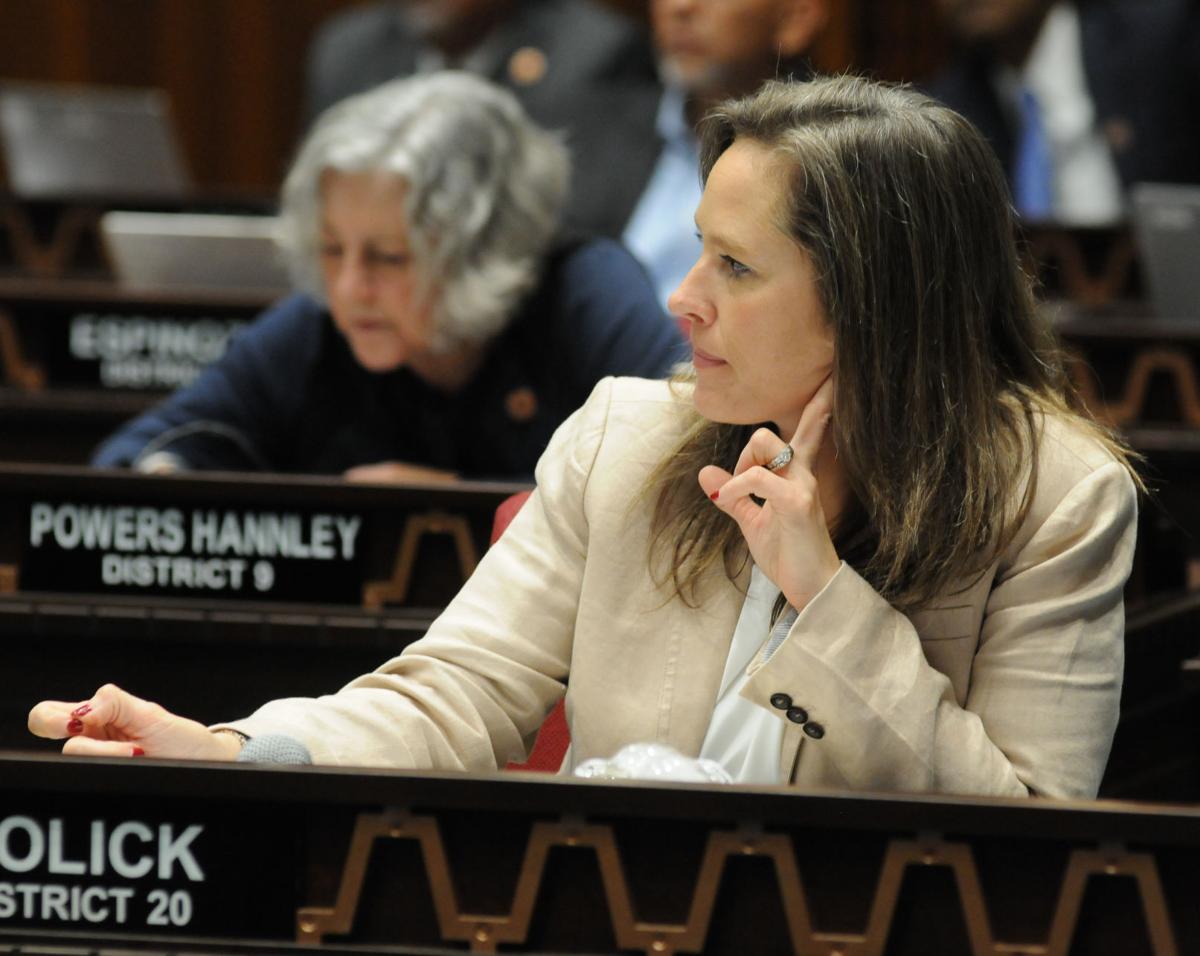PHOENIX т A court order allowing certain people to take their address out of public records does not mean they can hide it when they run for office, the УлшжжБВЅ Supreme Court ruled Tuesday.
The justices, however, agreed to let this one slide and permit state Rep. Shawnna Bolick, R-Phoenix, to seek a second term in the УлшжжБВЅ House even though she listed a mailing address on the spot on the nomination papers where it asks for a street address.
Chief Justice Robert Brutinel, writing for the court, said her тerroneousт entry on the papers was not done with the intent to defraud voters.
It also just so happens she is the wife of one of their colleagues.
But the justices in Tuesdayтs ruling made it clear that anyone who tries this in the future т including Bolick т тflirts with disqualification.т
People are also reading…
The decision has broader statewide implications. It could force future candidates who are legally eligible to shield addresses in some records to decide whether to list where they live т and give up their right to privacy and protection from possible harassment т or forego public office.
There is no question that Bolick listed the street address of a private mailbox service on her nominating petitions. She relied on the fact that husband, Clint, is a justice on the stateтs high court. And УлшжжБВЅ law allows judges and other figures to restrict public access to residential addresses on certain records.
So what showed up on her nomination papers in the space listed for residence address was the address of 610 E. Bell Road 2-142 in Phoenix.
That drew a legal challenge.
A trial judge ruled in May that her husbandтs status entitled her to make that move.
That was upheld in a summary order by the four justices of the Supreme Court who heard the case т not including Clint т who said the other address was тunlikely to have misled or confused votersт and that while she had not strictly complied with the law, she was in тsubstantialт compliance.
On Tuesday, in a full-blown eight-page opinion authored by Brutinel, the justices ratified the earlier order and further explained their belief that substantial compliance is enough т at least in this situation.
But Brutinel made it clear that he and his colleagues do not believe thatтs really the way the law reads.
тBased on residency requirements provided in the УлшжжБВЅ Constitution and the applicable statutes, candidates are required to provide their actual residence address on candidates nomination documents even if they are protected voters,т Brutinel said.
And if that isnтt clear, the chief justice issued a warning of sorts. He wrote that Tuesdayтs ruling based on the specific facts of this case allowing Bolick to run this year тdoes not mean she or any other candidate should use anything other than their actual residence address on future nomination papers and petitions.т
There was no immediate response from Bolick, who is seeking her second term representing the district in north-central Phoenix, about whether she will seek future office if the trade-off is having to list the address where she and her husband live.
A spokesman for Brutinel said he would have no comment about the decision and any reasons behind it beyond what is in the written opinion.
Central to the fight is a state law allowing certain individuals to ask for a court order to keep their residential addresses and those of everyone in their household off of voter registration records.
The ever-expanding list includes police officers and spouses, judges, prosecutors, public defenders, correctional officers, members of the Board of Executive Clemency, National Guard members who are supporting a law enforcement agency, individuals who have orders of protection and certain employees of child safety and adult protective services who have direct contact with families.
In agreeing to let Bolick remain on the ballot, Brutinel said the private mail box listed is in the same state, county, legislative district, city and ZIP code as where she actually lives. That, he said, shows there was no effort to mislead voters.
And Brutinel said Bolick тrelied, erroneouslyт on the court order allowing her to shield her address in certain public records as a reason not to list it on her nominating papers.
The chief justice also pointed out that Bolick used the same mailing address in her successful 2018 bid and, more to the point, that no one had challenged that.
тThere is no evidence to suggest she had prior knowledge of the error or intended to violate the statute,т he said, which is why the justices decided she was in тsubstantialт compliance with the law and could remain on the ballot, at least for this year.
Bolick is seeking to hang on to one of the two District 20 House seats she holds along with Rep. Anthony Kern, R-Glendale.
Photos: 2020 Primary Election in Pima and Maricopa counties
Primary Election in Pima County

An elections worker looks over a few of the early primary ballots at one of the scanning stations during counting at the Pima County Elections Center, УлшжжБВЅ, Ariz., August 4, 2020.
Primary Election in Pima County

A pair of elections workers look over an early primary ballot as part of the counting process at the Pima County Elections Center, УлшжжБВЅ, Ariz., August 4, 2020.
Primary Election in Pima County

Elections workers feed primary ballots in to scanners at the Pima County Elections Center, УлшжжБВЅ, Ariz., August 4, 2020.
Primary Election in Pima County

A poll worker waits inside the Pima County voting site at Morris K. Udall Recreational Center, 7200 E. Tanque Verde Rd., in УлшжжБВЅ, Ariz on August 4, 2020.
Primary Election in Pima County

Brad Nelson, left, Pima County elections director, helps Lisa Matthews, Pima County election marshal, put up a тWelcome Votersт sign after it was blown down outside of the Pima County voting site at Morris K. Udall Recreational Center, 7200 E. Tanque Verde Rd., in УлшжжБВЅ, Ariz on August 4, 2020.
Primary Election in Pima County

After voting, a voter walks back to their car at the Pima County polling site at Ellie Towne Flowing Wells Community Center, 1660 W. Ruthrauff Rd.., in УлшжжБВЅ, Ariz on August 4, 2020.
Primary Election in Pima County

A voter walks by a polling sign outside the Armory Park Center located at 220 S 5th Avenue during primary election day, on Aug. 4, 2020.
Primary Election in Pima County

Voters enter the УлшжжБВЅ Estates Multi-Purpose Hall located at 5900 W Western Way Circle, on Aug. 4, 2020.
Primary Election in Pima County

Gilbert Silva walks through the parking lot of the Valencia Library located at 202 W Valencia Road to cast his vote during primary election day, on Aug. 4, 2020.
Primary Election in Pima County

A poll worker (right) takes a completed ballot from a voter at the Valencia Library located at 202 W Valencia Road during primary election day, on Aug. 4, 2020.
Primary Election in Pima County

After placing their vote, a voter starts to place their "I Voted" sticker on their shirt as they leave the Pima County voting site at Temple Emanu-El, 225 N. Country Club Rd., in УлшжжБВЅ, Ariz on August 4, 2020.
Primary Election in Pima County

A poll worker wearing a face shield, mask and gloves walks outside to check if anyone needs assistance at the Pima County polling site at Ellie Towne Flowing Wells Community Center, 1660 W. Ruthrauff Rd.., in УлшжжБВЅ, Ariz on August 4, 2020.
Primary Election in Pima County

A voters arrives at the Pima County polling site at Ellie Towne Flowing Wells Community Center, 1660 W. Ruthrauff Rd.., in УлшжжБВЅ, Ariz to drop off their voting ballot on August 4, 2020.
Primary Election in Pima County

A voter leaves the Pima County polling site at Ellie Towne Flowing Wells Community Center, 1660 W. Ruthrauff Rd.., in УлшжжБВЅ, Ariz on August 4, 2020. Photo by Rebecca Sasnett / УлшжжБВЅ
Primary Election in Maricopa County

A portrait of Ashlee King after she voted, August 4, 2020, at the El Tianguis Mercado polling place, 9201 S. Avenida Del Yaqui, Guadalupe.
Primary Election in Maricopa County

Anita Cota-Soto washes her hands before voting, August 4, 2020, at the El Tianguis Mercado, 9201 S. Avenida Del Yaqui, Guadalupe. Cota-Soto is a Town of Guadalupe councilmember running for re-election.
Primary Election in Maricopa County

Voting marshal Gerry Lamanski checks his watch before announcing the polls are open, August 4, 2020, at the Tempe History Museum, 809 E. Southern Ave., Tempe.
Primary Election in Maricopa County

People vote on Election Day at Nueva Vida Church in Scottsdale on Aug. 4, 2020.
Primary Election in Maricopa County

Voters walk to a polling station to cast votes for GOP and Democratic candidates for the primary election Tuesday, Aug. 4, 2020, in Chandler, Ariz. (AP Photo/Ross D. Franklin)
Primary Election in Maricopa County

Voters walk to a polling station to cast votes for GOP and Democratic primary candidates Tuesday, Aug. 4, 2020, in Chandler, Ariz. (AP Photo/Ross D. Franklin)
Primary Election in Maricopa County

A voter wearing a face covering exits a polling station to cast votes for GOP and Democratic primary candidates, as a polling station workers opens the door for voters Tuesday, Aug. 4, 2020, in Chandler, Ariz. (AP Photo/Ross D. Franklin)
On Twitter: @azcapmedia














